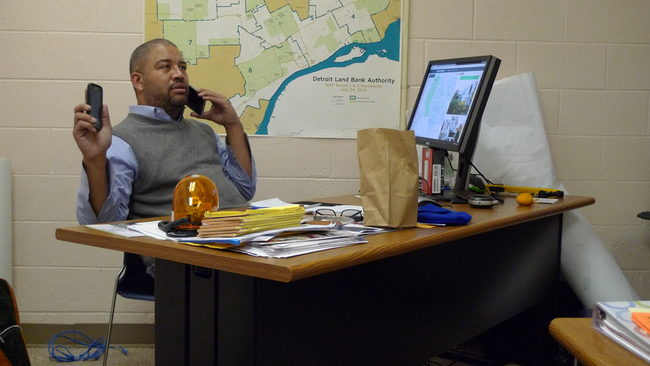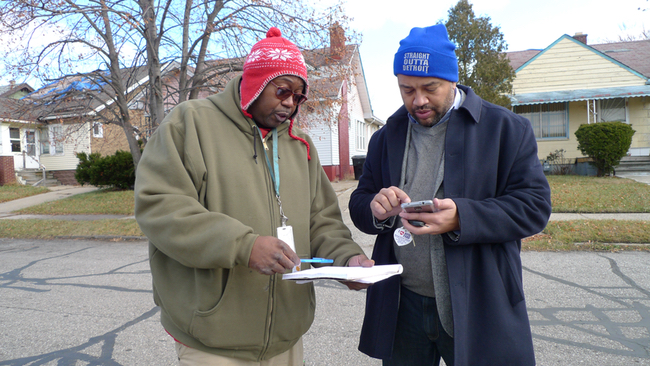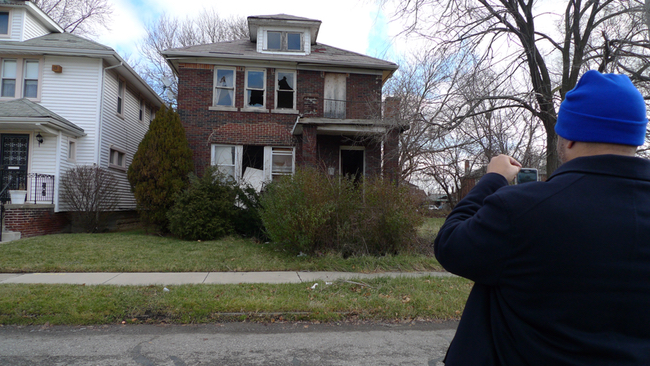In Detroit, city hall tries a new approach: helping
For a man with Marshall Bullock’s job, one cell phone is not enough.
Bullock, one of Detroit’s newly minted district managers, carries two and sometimes deploys both at the same time. When you’re trying to rejuvenate a city, in a job that is a constant and shifting array of diplomacy and creative problem-solving, requiring bottomless optimism, fierce pragmatism and a seat-of-the-pants willingness to improvise – well, put it this way: The calls rarely stop.
On this particular Friday, Bullock, 47, has returned to his office from a morning in the field to find 19 voicemails stacked up and circling to land. Working his way through them will take a couple of hours, spent in the cacophony of his office at the Adams-Butzel Recreation Center on the city’s west side, where, needless to say, he has an open-door policy. (He’ll get some drop-ins this afternoon, too.)
But this is the job he has chosen, and he’s never bored.
District managers are the shock troops for Mayor Mike Duggan’s new Department of Neighborhoods, the fulfillment of a campaign promise to streamline services to the city’s residential areas, which haven’t attracted the attention that the reawakening central city has. It’s also a new approach to Detroit’s most intractable problems, notably blight and its associated miseries. In a city that sprawls over 138 square miles, and is not famous for customer service, city hall can seem as far away as the moon. But the two managers in each council district – Bullock’s is the 7th – are there to knock on doors, show up at block club meetings and otherwise represent an administration determined to turn Detroit around. Newly emerged from bankruptcy and still under a national spotlight, the city’s caretakers know it has to improve to survive. Helping it do so is the job of the district managers, who break a city of roughly 700,000 into seven pieces, and then put a human face – preferably with a smile and solutions – in each.
Search for creative solutions
This particular day for Bullock (whom everyone calls by his last name, no Marshall or mister) started downtown, in a meeting for a new program to bring blight treatment to the grassroots level, literally, by getting more abandoned buildings boarded up.
“We can’t spend city money on (blighted) private property,” Bullock explains, so no city crews can do the job. But the city can buy plywood and drop it off at the homes of neighborhood residents willing to do the work themselves, perhaps with some help from a volunteer contractor. The following day, the city will do just that in Bullock’s district, and after the meeting, he heads out to the Littlefield Community, a neighborhood surrounding Noble Elementary School, to check in with the residents who’ve agreed to accept the plywood delivery.
They don’t answer the door, but the delivery is still on for later – it’ll be left for them, and Bullock planned to be back the following day at 8 a.m. with coffee and doughnuts to fortify the laborers. But first, some “before” photos of the targeted properties, for his report to the city. A contractor’s van rolls up, driven by Anthony Sykes of Lakeshore-Rickman, the contractor volunteering help. It turns out the two men went to high school together, underscoring that even in this very large civic footprint, many small towns exist.
Sykes and Bullock compare lists. The plan is to board up every vacant and blighted house that faces Noble Elementary, and there are at least a couple dozen. The school’s grounds double as the neighborhood park, and besides the threat the blighted properties pose to children walking to school, residents also want to de-emphasize the blight that threatens the whole district -- at least as much as it can be.
“Blights and lights” are by far the top issues for the residents of the 7th district. Both are stubborn problems, but street lighting, now under the administration of another new agency, the Public Lighting Authority, is slowly improving. Blight is proving more stubborn. The Detroit Land Bank is auctioning salvageable properties, but they are far outnumbered by the ones that remain. It’s an issue Bullock devotes considerable thought to.
“Blight eradication must be surgical,” he said, explaining that a block with two blighted structures may benefit more from eradication than one with more. There’s a tipping point that makes the less-blighted block worth more attention than the worse one. Tear down two bad houses, everybody’s house looks better, and those who remain might be able to buy the now-bare plots through the side-lot program, part of the Detroit Land Bank. On the more blighted block, all you end up with is the gap-toothed, little-house-on-the-prairie effect.
Lights are another matter, and as they start to come on around the city, Bullock finds he has to rely on another skill in his portfolio: Diplomacy.
The new LED lights are brighter but more focused, and don’t project the ambient glow of the old ones, so “people complain that their yards aren’t lit,” he said. “I tell them they need to turn on their porch lights and leave them on all night.” Some seem to have never even considered such a thing. Bullock tells them just three or four on a block can make the difference between a strip that looks attended to and one that doesn’t.
One job, many duties
All these tasks – organization, introductions, diplomacy – are skills Bullock, an Eagle Scout, learned along the course of his unconventional career choices, which were mainly in social work but also included odder jobs, like concierge service for visitors to South Florida, where he used to live before moving back to his hometown. He worked on Duggan’s campaign, and when the district manager jobs were created, he applied because it seemed to call upon all of his skills, as well as his talent.
“I have a gift for relationships,” he said over lunch at Lou’s Deli, a peculiarly Detroit institution, where traditional corned-beef sandwiches are served from behind bulletproof glass. He needed that gift in his first weeks of the job, spent introducing himself around the district, attending neighborhood gatherings and meeting community leaders.
“You have to find the community,” he said, and demonstrate to them that the administration is serious about improving the city. “There’s no database for that. You just have to get out there.
“The city has been operating inefficiently for how many years?” he said. “People have never had a member of the mayor’s office pay attention to them, and to actually bring the mayor himself out, and to have him sitting in your living room? That’s something.”
Cynthia Lowe, one of those residents, agrees. Lowe alerted Bullock to a problem of constant water seeping from an underground rupture in the Plymouth-Shaeffer area into the street, complete with photos, and got satisfaction within days.
“We’re in the ghetto, and I like the fact he and the mayor are listening to us. They’re under fire a lot of the time, but they calm us down, talk to us and work with us,” she said.
Troubleshooters, ambassadors, blight-busters
The district managers were introduced at Duggan’s February 2014 State of the City address, when the city was still in bankruptcy and under emergency management, and there was very little leeway to establish a whole new department. The first order of business was getting them the tools they needed to do their jobs, said Victoria Kovari, deputy director of the Department of Neighborhoods.
“They didn’t even have phones until March,” said Kovari. “And we had to get a grant for that.” (The Local Initiatives Support Corp., a national organization dedicated to neighborhood improvement, provided the funds.) Office space had to be already available, hence the rec-center spaces.
Once they were equipped, and once their numbers and contact information were posted on the city’s website, they were “inundated” with calls for help, Kovari said. Each has a deputy; Bullock’s is Mona Ali, who works primarily with the neighborhoods of predominantly Arab Americans along the district’s border with Dearborn. When Duggan holds council-district community meetings, required under the new charter, he asks for a show of hands from those who know who their district manager is, “and part of how he judges us is based on how many hands go up,” Kovari said.
Bullock makes hands go up in part by how he handles his calls. Everyone who calls, who leaves a message and a name, gets added to his phone’s contact list, perhaps with a note about what their complaint is. On subsequent calls, he can greet them by name as he answers, a gesture of connection that makes residents feel heard.
Each manager also has a specific city department to track and report to other managers on, and Bullock’s is Detroit’s Department of Transportation. He fiddles with the DDOT app on his phone, where it lives with DPD Connect (the police department’s app), Blexting (to report blight), and Detroit Delivers (to report downed trees, backed-up storm drains and other problems). All are available in the app stores for smartphone operating systems.
Today, the computer in his office is getting as much of a workout as the phone. As he spins through the afternoon’s voice mails, many are calling about specific locations, but not all have an address; the property is “across the street, on the corner.” When he calls back, he uses Motor City Mapping’s parcel survey, Google Maps and other tools to first identify what the caller is concerned about, and see whether a parcel has been declared blighted, foreclosed upon or otherwise remarkable.
A job that sprawls, like the city
He puts callers in touch with their district police officers to report illegal metal scrapping or squatting. And he suggests other agencies – for aging adults, mostly – when it seems called for. He tells one caller that the house in question is in foreclosure and will soon be resold, hangs up and reflects on a particular problem in Detroit.
“Some people still seem to believe that you can buy a piece of property and do nothing to it at all, and it will still rise in value,” he said, shaking his head. Foreclosure is a snarl all by itself. Depending on the reason for it, properties may end up in the hands of the county, banks or other parties.
The day is winding down, but finishing office tasks is frequently just a prelude to a second, evening shift of attending meetings of block clubs and other groups. He’s also downtown three to four days a week; the district managers meet with Duggan as a group weekly.
The job seems to sprawl as much as the city does, to fill every minute from morning coffee to the evening commute, and then some, a lot of hours for a $75,000 salary. Bullock admits there are days when he relies on his wife to hold down their home life just a little while longer.
But, he said, “the mayor is a neighborhood guy.” And this, block by block, lot by lot, is where the city will make its recovery.
“We have to get people moving forward again.”
Bridge Magazine is convening partner for the Detroit Journalism Cooperative (DJC), comprised of five nonprofit media outlets focused on the city’s future after bankruptcy. The group includes Michigan Radio,WDET, Detroit Public Television and New Michigan Media. Support for the DJC comes from the John S. and James L. Knight Foundation, Renaissance Journalism’s Michigan Reporting Initiative and the Ford Foundation.
See what new members are saying about why they donated to Bridge Michigan:
- “In order for this information to be accurate and unbiased it must be underwritten by its readers, not by special interests.” - Larry S.
- “Not many other media sources report on the topics Bridge does.” - Susan B.
- “Your journalism is outstanding and rare these days.” - Mark S.
If you want to ensure the future of nonpartisan, nonprofit Michigan journalism, please become a member today. You, too, will be asked why you donated and maybe we'll feature your quote next time!


 When Detroit district manager Marshall Bullock gets to returning phone calls from residents, he frequently finds himself using two – his city-provided phone and his personal one. (Bridge photo by Nancy Derringer)
When Detroit district manager Marshall Bullock gets to returning phone calls from residents, he frequently finds himself using two – his city-provided phone and his personal one. (Bridge photo by Nancy Derringer) Anthony Sykes, left, and Marshall Bullock confer on an upcoming blight-boarding project in Detroit’s 7th Council District, which Bullock is overseeing. Sykes will provide volunteer help through Lakeshore-Rickman, the contracting firm he works for. (Bridge photo by Nancy Derringer)
Anthony Sykes, left, and Marshall Bullock confer on an upcoming blight-boarding project in Detroit’s 7th Council District, which Bullock is overseeing. Sykes will provide volunteer help through Lakeshore-Rickman, the contracting firm he works for. (Bridge photo by Nancy Derringer) Marshall Bullock photographs a blighted house scheduled to be boarded up in Detroit’s 7th Council District, where he serves as district manager. Before-and-after photos of such projects are part of his weekly reports to the city’s Department of Neighborhoods. (Bridge photo by Nancy Derringer)
Marshall Bullock photographs a blighted house scheduled to be boarded up in Detroit’s 7th Council District, where he serves as district manager. Before-and-after photos of such projects are part of his weekly reports to the city’s Department of Neighborhoods. (Bridge photo by Nancy Derringer)